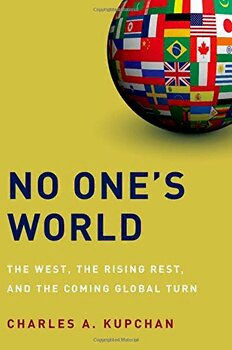Table Of ContentNO ONE’S WORLD
00_Kupchan_FM.indd i 12/29/2011 8:18:56 PM
Th e Council on Foreign Relations (CFR) is an independent, nonpartisan membership
o rganization, think tank, and publisher dedicated to being a resource for its members,
government offi cials, business executives, journalists, educators and students, civic and
religious leaders, and other interested citizens in order to help them better understand the
world and the foreign policy choices facing the United States and other countries. Founded
in 1921, CFR carries out its mission by maintaining a diverse membership, with special
programs to promote interest and develop expertise in the next generation of foreign policy
leaders; convening meetings at its headquarters in New York and in Washington, DC, and
other cities where senior government offi cials, members of Congress, global leaders, and
prominent thinkers come together with CFR members to discuss and debate major inter-
national issues; supporting a Studies Program that fosters independent research, enabling
CFR scholars to produce articles, reports, and books and hold roundtables that analyze
foreign policy issues and make concrete policy recommendations; publishing Foreign
Aff airs, the preeminent journal on international aff airs and U.S. foreign policy; sponsoring
Independent Task Forces that produce reports with both fi ndings and policy prescriptions
on the most important foreign policy topics; and providing up-to-date information and
analysis about world events and American foreign policy on its website, www.cfr.org.
Th e Council on Foreign Relations takes no institutional positions on policy issues and has
no affi liation with the U.S. government. All views expressed in its publications and on its
website are the sole responsibility of the author or authors.
00_Kupchan_FM.indd ii 12/29/2011 8:18:56 PM
N O O N E ’ S
WOR L D
the west, the rising rest, and
the coming global turn
C H A R L E S A . K U P C H A N
A Council on Foreign Relations Book
1
00_Kupchan_FM.indd iii 12/29/2011 8:18:56 PM
3
Oxford University Press, Inc., publishes works that further
Oxford University’s objective of excellence
in research, scholarship, and education.
Oxford New York
Auckland Cape Town Dar es Salaam Hong Kong Karachi
Kuala Lumpur Madrid Melbourne Mexico City Nairobi
New Delhi Shanghai Taipei Toronto
With offi ces in
Argentina Austria Brazil Chile Czech Republic France Greece
Guatemala Hungary Italy Japan Poland Portugal Singapore
South Korea Switzerland Th ailand Turkey Ukraine Vietnam
Copyright © 2012 by Charles A. Kupchan
Published by Oxford University Press, Inc.
198 Madison Avenue, New York, NY 10016
www.oup.com
Oxford is a registered trademark of Oxford University Press
All rights reserved. No part of this publication may be reproduced,
stored in a retrieval system, or transmitted, in any form or by any means,
electronic, mechanical, photocopying, recording, or otherwise,
without the prior permission of Oxford University Press.
CIP record is available from the Library of Congress.
ISBN-13: 978-0-19-973939-4
9 8 7 6 5 4 3 2 1
Printed in the United States of America
on acid-free paper
00_Kupchan_FM.indd iv 12/29/2011 8:18:56 PM
To my family; past, present, and future
00_Kupchan_FM.indd v 12/29/2011 8:18:56 PM
This page intentionally left blank
C O N T E N T S
Acknowledgments ix
1 Th e Turn 1
2 Th e Rise of the West 13
3 Th e Last Turn: Th e West Bests the Rest 46
4 Th e Next Turn: Th e Rise of the Rest 74
5 Alternatives to the Western Way 86
6 Reviving the West 146
7 Managing No One’s World 182
Notes 206
Bibliography 233
Index 245
00_Kupchan_FM.indd vii 12/29/2011 8:18:56 PM
This page intentionally left blank
A C K N O W L E D G M E N T S
For the last two hundred years, Europe and the United States
have together shaped the nature of the modern world. Backed by
its power as well as its ideas, the West served as both the architect
and the steward of the globalized order that began to emerge in the
nineteenth century. With the collapse of the Soviet Union late in the
twentieth century, the Western way—liberal democracy, capitalism,
and secular nationalism—appeared to have fi nally prevailed against
its many challengers.
Th e West has certainly enjoyed an extended and impressive era
of global dominance, but the clock is running out on its primacy. As
this new century unfolds, power will become more widely distrib-
uted around the globe. Countries that long operated in the shadow
of Western hegemony are now entering the top ranks and expecting
a level of infl uence commensurate with their position.
How will the world change as developing regions acquire new
wealth, military strength, and sway? Will the West’s ideas and
conceptions of political order outlast its primacy, or will emerging
powers generate their own approaches to governance, commerce,
statecraft , and the management of global aff airs? Th e answers to
these questions will have a major impact on the nature of the world
that emerges as the twenty-fi rst century progresses.
I began to probe these issues over a decade ago. In 2002, I pub-
lished Th e End of the American Era, a book that foretold the wan-
ing of U.S. primacy and the onset of a multipolar world. My last
book, How Enemies Become Friends (2010), examined how and
00_Kupchan_FM.indd ix 12/29/2011 8:18:56 PM

